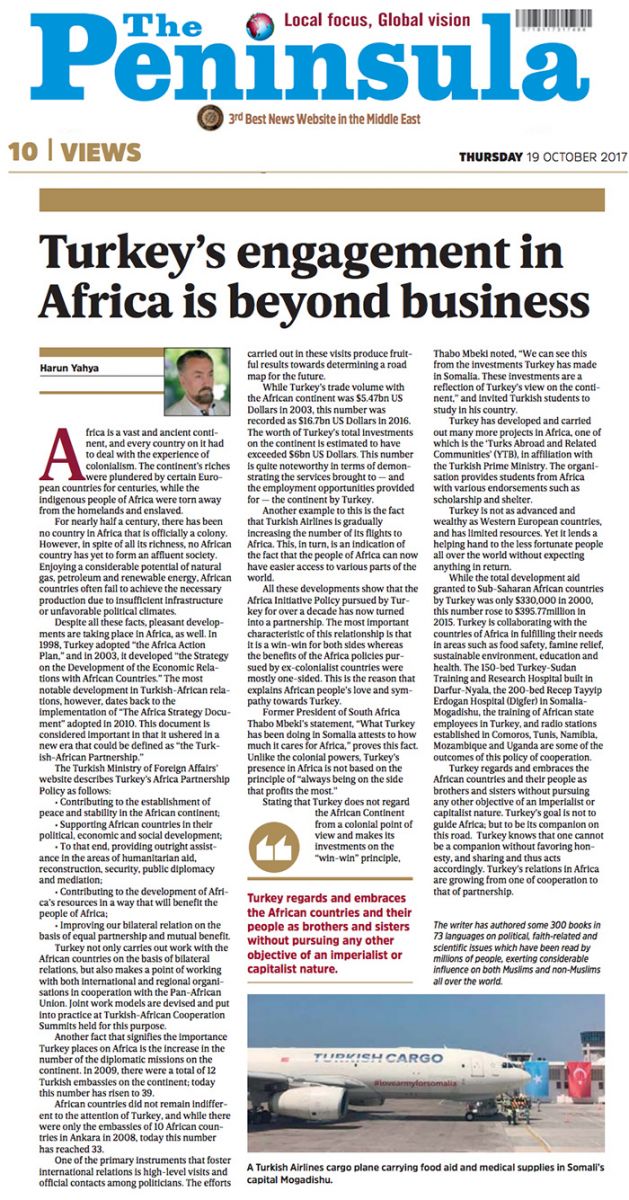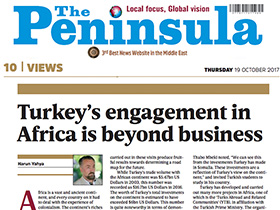
Africa is a vast and ancient continent, and every country on it had to deal with the experience of colonialism. The continent's riches were plundered by certain European countries for centuries, while the indigenous people of Africa were torn away from the homelands and enslaved.
For nearly half a century, there has been no country in Africa that is officially a colony. However, in spite of all its richness, no African country has yet to form an affluent society. Enjoying a considerable potential of natural gas, petroleum and renewable energy, African countries often fail to achieve the necessary production due to insufficient infrastructure or unfavorable political climates.
Despite all these facts, pleasant developments are taking place in Africa, as well. In 1998, Turkey adopted "the Africa Action Plan," and in 2003, it developed "the Strategy on the Development of the Economic Relations with African Countries." The most notable development in Turkish-African relations, however, dates back to the implementation of "The Africa Strategy Document" adopted in 2010. This document is considered important in that it ushered in a new era that could be defined as "the Turkish-African Partnership."
The Turkish Ministry of Foreign Affairs’ website describes Turkey's Africa Partnership Policy as follows:
- Contributing to the establishment of peace and stability in the African continent;
- Supporting African countries in their political, economic and social development;
- To that end, providing outright assistance in the areas of humanitarian aid, reconstruction, security, public diplomacy and mediation;
- Contributing to the development of Africa's resources in a way that will benefit the people of Africa;
- Improving our bilateral relation on the basis of equal partnership and mutual benefit.
Turkey not only carries out work with the African countries on the basis of bilateral relations, but also makes a point of working with both international and regional organizations in cooperation with the Pan-African Union. Joint work models are devised and put into practice at Turkish-African Cooperation Summits held for this purpose.
Another fact that signifies the importance Turkey places on Africa is the increase in the number of the diplomatic missions on the continent. In 2009, there were a total of 12 Turkish embassies on the continent; today this number has risen to 39. African countries did not remain indifferent to the attention of Turkey, and while there were only the embassies of 10 African countries in Ankara in 2008, today this number has reached 33.
One of the primary instruments that foster international relations is high-level visits and official contacts among politicians. The efforts carried out in these visits produce fruitful results towards determining a road map for the future.
While Turkey's trade volume with the African continent was $5.47 billion US Dollars in 2003, this number was recorded as $16.7 billion US Dollars in 2016. The worth of Turkey's total investments on the continent is estimated to have exceeded $6 billion US Dollars. This number is quite noteworthy in terms of demonstrating the services brought to - and the employment opportunities provided for - the continent by Turkey. Another example to this is the fact that Turkish Airlines is gradually increasing the number of its flights to Africa. This, in turn, is an indication of the fact that the people of Africa can now have easier access to various parts of the world.
All these developments show that the Africa Initiative Policy pursued by Turkey for over a decade has now turned into a partnership. The most important characteristic of this relationship is that it is a win-win for both sides whereas the benefits of the Africa policies pursued by ex-colonialist countries were mostly one-sided. This is the reason that explains African people's love and sympathy towards Turkey.
Former President of South Africa Thabo Mbeki's statement, "What Turkey has been doing in Somalia attests to how much it cares for Africa," proves this fact. Unlike the colonial powers, Turkey's presence in Africa is not based on the principle of "always being on the side that profits the most." Stating that Turkey does not regard the African Continent from a colonial point of view and makes its investments on the "win-win" principle, Thabo Mbeki noted, "We can see this from the investments Turkey has made in Somalia. These investments are a reflection of Turkey's view on the continent," and invited Turkish students to study in his country.
Turkey has developed and carried out many more projects in Africa, one of which is the ‘Turks Abroad and Related Communities’ (YTB), in affiliation with the Turkish Prime Ministry. The organization provides students from Africa with various endorsements such as scholarship and shelter.
Turkey is not as advanced and wealthy as Western European countries, and has limited resources. Yet it lends a helping hand to the less fortunate people all over the world without expecting anything in return.
While the total development aid granted to Sub-Saharan African countries by Turkey was only $330,000 in 2000, this number rose to $395.77 million in 2015. Turkey is collaborating with the countries of Africa in fulfilling their needs in areas such as food safety, famine relief, sustainable environment, education and health. The 150-bed Turkey-Sudan Training and Research Hospital built in Darfur-Nyala, the 200-bed Recep Tayyip Erdogan Hospital (Digfer) in Somalia-Mogadishu, the training of African state employees in Turkey, and radio stations established in Comoros, Tunis, Namibia, Mozambique and Uganda are some of the outcomes of this policy of cooperation.
Turkey regards and embraces the African countries and their people as brothers and sisters without pursuing any other objective of an imperialist or capitalist nature. Turkey's goal is not to guide Africa; but to be its companion on this road. Turkey knows that one cannot be a companion without favoring honesty, and sharing and thus acts accordingly. Turkey's relations in Africa are growing from one of cooperation to that of partnership.
Adnan Oktar's piece in The Peninsula Qatar


